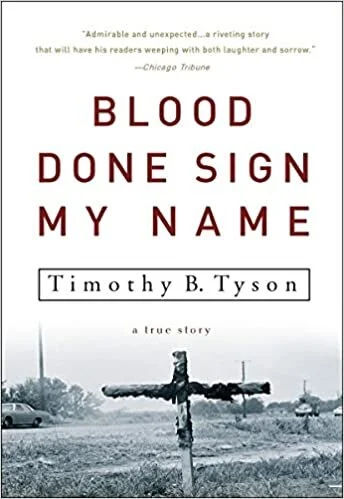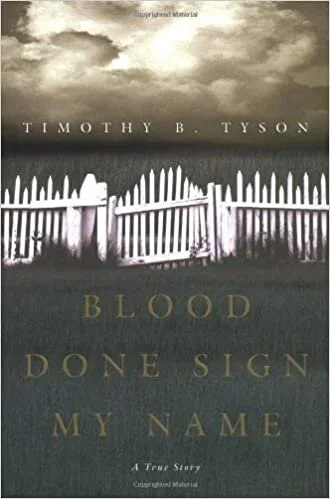Blood Done Sign My Name
The “riveting”* true story of the fiery summer of 1970, which would forever transform the town of Oxford, North Carolina—a classic portrait of the fight for civil rights in the tradition of To Kill a Mockingbird
*Chicago Tribune
On May 11, 1970, Henry Marrow, a twenty-three-year-old black veteran, walked into a crossroads store owned by Robert Teel and came out running. Teel and two of his sons chased and beat Marrow, then killed him in public as he pleaded for his life.
Like many small Southern towns, Oxford had barely been touched by the civil rights movement. But in the wake of the killing, young African Americans took to the streets. While lawyers battled in the courthouse, the Klan raged in the shadows and black Vietnam veterans torched the town’s tobacco warehouses. Tyson’s father, the pastor of Oxford’s all-white Methodist church, urged the town to come to terms with its bloody racial history. In the end, however, the Tyson family was forced to move away.
Tim Tyson’s gripping narrative brings gritty blues truth and soaring gospel vision to a shocking episode of our history.
The “riveting”* true story of the fiery summer of 1970, which would forever transform the town of Oxford, North Carolina—a classic portrait of the fight for civil rights in the tradition of To Kill a Mockingbird
*Chicago Tribune
On May 11, 1970, Henry Marrow, a twenty-three-year-old black veteran, walked into a crossroads store owned by Robert Teel and came out running. Teel and two of his sons chased and beat Marrow, then killed him in public as he pleaded for his life.
Like many small Southern towns, Oxford had barely been touched by the civil rights movement. But in the wake of the killing, young African Americans took to the streets. While lawyers battled in the courthouse, the Klan raged in the shadows and black Vietnam veterans torched the town’s tobacco warehouses. Tyson’s father, the pastor of Oxford’s all-white Methodist church, urged the town to come to terms with its bloody racial history. In the end, however, the Tyson family was forced to move away.
Tim Tyson’s gripping narrative brings gritty blues truth and soaring gospel vision to a shocking episode of our history.
The “riveting”* true story of the fiery summer of 1970, which would forever transform the town of Oxford, North Carolina—a classic portrait of the fight for civil rights in the tradition of To Kill a Mockingbird
*Chicago Tribune
On May 11, 1970, Henry Marrow, a twenty-three-year-old black veteran, walked into a crossroads store owned by Robert Teel and came out running. Teel and two of his sons chased and beat Marrow, then killed him in public as he pleaded for his life.
Like many small Southern towns, Oxford had barely been touched by the civil rights movement. But in the wake of the killing, young African Americans took to the streets. While lawyers battled in the courthouse, the Klan raged in the shadows and black Vietnam veterans torched the town’s tobacco warehouses. Tyson’s father, the pastor of Oxford’s all-white Methodist church, urged the town to come to terms with its bloody racial history. In the end, however, the Tyson family was forced to move away.
Tim Tyson’s gripping narrative brings gritty blues truth and soaring gospel vision to a shocking episode of our history.

